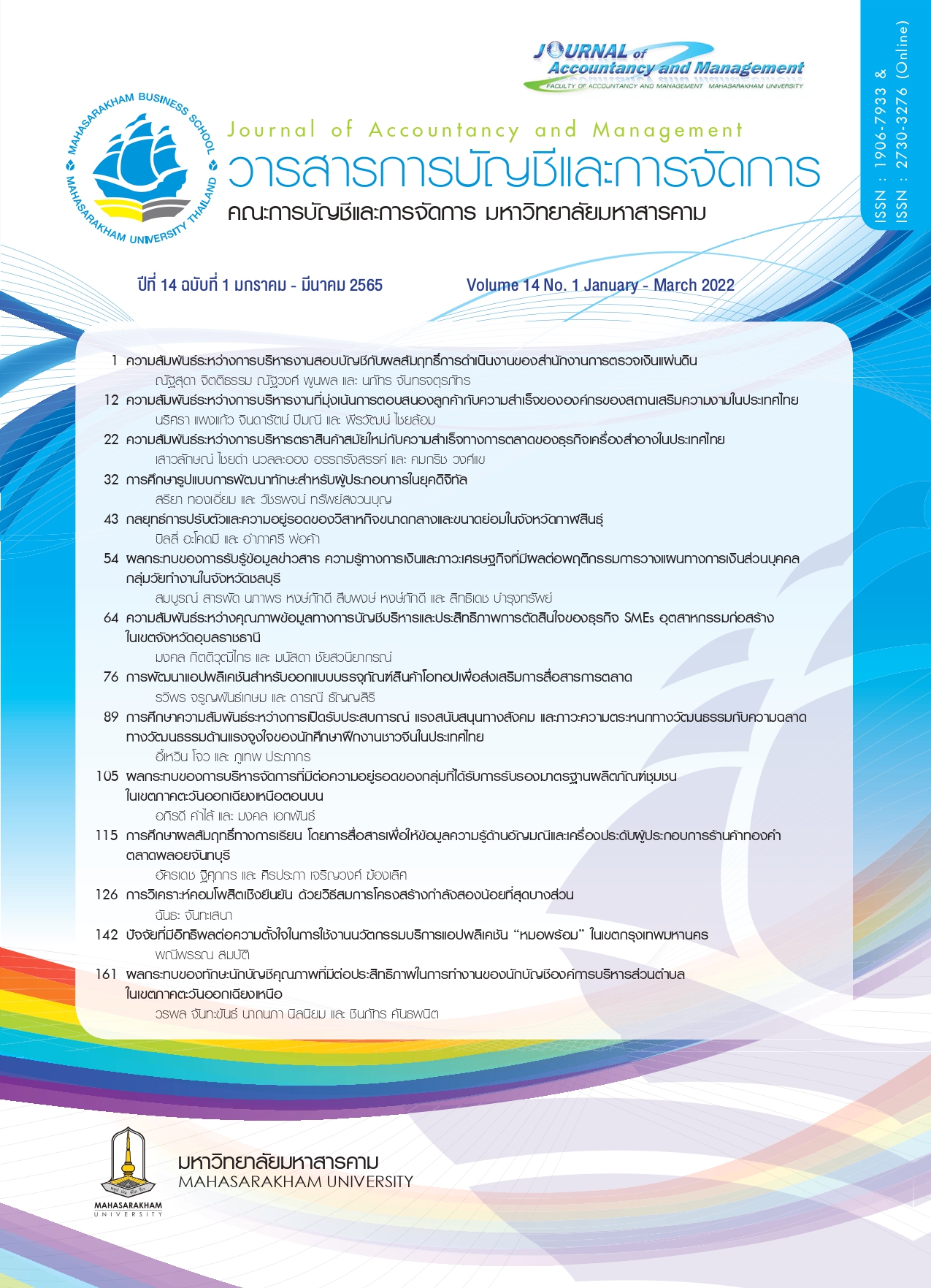การศึกษาความสัมพันธ์ระหว่างการเปิดรับประสบการณ์ แรงสนับสนุนทางสังคม และภาวะความตระหนกทางวัฒนธรรมกับความฉลาดทางวัฒนธรรมด้านแรงจูงใจของนักศึกษาฝึกงานชาวจีนในประเทศไทย
Main Article Content
บทคัดย่อ
ความฉลาดทางวัฒนธรรมด้านแรงจูงใจมีบทบาทสำคัญในการแข่งขันธุรกิจระหว่างประเทศ โดยเฉพาะการสร้างทรัพยากรมนุษย์ที่มีความสามารถในการจัดการธุรกิจต่างวัฒนธรรมได้ นับเป็นเรื่องสำคัญอย่างยิ่ง งานวิจัยนี้มุ่งศึกษาความสัมพันธ์ระหว่างสภาวะการเปิดรับประสบการณ์ แรงสนับสนุนจากสังคม (บุคคลสำคัญ สมาชิกในครอบครัว เพื่อน) และความฉลาดทางวัฒนธรรมด้านแรงจูงใจ การดำเนินงานวิจัยนี้เป็นแบบผสม (Mixed Methods Research) โดยใช้แบบสอบถามและการสัมภาษณ์เป็นเครื่องมือการวิจัย กลุ่มตัวอย่างได้แก่ 1. นักศึกษาฝึกงานชาวจีนที่มาศึกษาในประเทศไทยเวลา 2 ปีขึ้นไป และ 2. ผู้ที่กลับจากประเทศไทยไปทำงานที่ประเทศจีน จำนวนทั้งสิ้น 120 คนได้รับแบบสอบถามตอบกลับมาจำนวน 117 คนและเลือกสัมภาษณ์แบบเจาะจงจำนวน 3 คนเพื่อวิเคราะห์ความขัดแย้งทางวัฒนธรรมที่เกิดขึ้นหลังจากกลับไปทำงานที่ประเทศจีน ผลการศึกษาพบว่า 1. การเปิดรับประสบการณ์มีความสัมพันธ์เชิงบวกกับความฉลาดทางวัฒนธรรมด้านแรงจูงใจอย่างมีนัยสำคัญทางสถิติ 2. แรงสนับสนุนทางสังคมจากบุคคลสำคัญ ได้แก่ หัวหน้างาน ผู้ดูแลมีความสัมพันธ์เชิงบวกกับความฉลาดทางวัฒนธรรมด้านแรงจูงใจอย่างมีนัยสำคัญทางสถิติ 3.แรงสนับสนุนทางสังคมจากเพื่อนมีความสัมพันธ์เชิงลบกับความฉลาดทางวัฒนธรรมด้านแรงจูงใจอย่างมีนัยสำคัญทางสถิติ 4.แรงสนับสนุนทางสังคมจากครอบครัวไม่มีความสัมพันธ์กับความฉลาดทางวัฒนธรรมด้านแรงจูงใจ 5.ระยะเวลาในการศึกษาที่ประเทศไทยไม่มีความสัมพันธ์กับความฉลาดทางวัฒนธรรมด้านแรงจูงใจ 6. นักศึกษาชาวจีนที่เดินกลับจากประเทศไทยเข้าสู่ภาคธุรกิจในประเทศจีนไม่แสดงภาวะความตระหนกทางวัฒนธรรมเมื่อต้องกลับไปอยู่ในวัฒนธรรมเดิม กลุ่มธุรกิจการค้าระหว่างประเทศสามารถนำผลการวิจัยนี้ ไปกำหนดนโยบายการพัฒนาทรัพยากรมนุษย์ให้เกิดความสามารถในการจัดการ บริหารธุรกิจระหว่างประเทศภายใต้ความแตกต่างทางวัฒนธรรมได้อย่างมีประสิทธิภาพยิ่งขึ้น
Downloads
Article Details

อนุญาตภายใต้เงื่อนไข Creative Commons Attribution-NonCommercial-NoDerivatives 4.0 International License.
บทความที่ได้รับการตีพิมพ์เป็นลิขสิทธิ์ของวารสารการบัญชีและการจัดการ
ข้อความที่ปรากฏในบทความแต่ละเรื่องในวารสารวิชาการเล่มนี้เป็นความคิดเห็นส่วนตัวของผู้เขียนแต่ละท่านไม่เกี่ยวข้องกับมหาวิทยาลัยมหาสารคาม และคณาจารย์ท่านอื่นๆในมหาวิทยาลัยฯ แต่อย่างใด ความรับผิดชอบองค์ประกอบทั้งหมดของบทความแต่ละเรื่องเป็นของผู้เขียนแต่ละท่าน หากมีความผิดพลาดใดๆ ผู้เขียนแต่ละท่านจะรับผิดชอบบทความของตนเองแต่ผู้เดียว
เอกสารอ้างอิง
คมกริช นันทะโรจพงศ์. (2564). การเสริมสร้างพฤติกรรมการเป็นผู้ประกอบการภายในองค์การของธุรกิจขนาดกลางและขนาดย่อมที่มีนวัตกรรม : อิทธิพลของการรับรู้ภาวะผู้นำการเปลี่ยนแปลง การจัดการทรัพยากรมนุษย์อย่างมีสมรรถนะสูง และการรับรู้ความสามารถของตนเอง. วารสารการบัญชีและการจัดการ มหาวิทยาลัยมหาสารคาม, 13(1), 44-65.
ปกรณ์ ขันช้อน และกนกอร สมปราชญ์. (2560). การพัฒนาแนวทางเพื่อพัฒนาภาวะผู้นำยุคโลกาภิวัตน์สำหรับผู้บริหารวิทยาลัยอาชีวศึกษา. วารสารการบริหารการศึกษา มหาวิทยาลัยขอนแก่น, 13(1), 225-236.
Ang, S., Van Dyne, L., Koh, C., Ng, K. Y., Templer, K. J., Tay, C., & Chandrasekar, N. A. (2007). Cultural Intelligence: Its Measurement and Effects on Cultural Judgment and Decision Making, Cultural Adaptation and Task Performance. Management and Organization Review, 3(3), 335–371.
Ang, S., Van Dyne, L., & Koh, C. (2006). Personality Correlates of the Four-Factor Model of Cultural Intelligence. Group & Organization Management, 31(1), 100–123.
Ang, S., & Van Dyne, L. (2008). Handbook of cultural intelligence: Theory, measurement, and Applications. (1st ed.). New York : Routledge.
Costa, P. T., Jr., & McCrae, R. R. (1992). Revised NEO Personality Inventory (NEO-PI-R) and the NEO Five-Factor Inventory (NEO-FFI) professional manual. Odessa, FL : Psychological Assessment Resources.
Costa, P. T., Jr., McCrae, R. R., & Kay, G. G. (1995). Persons, Places, and Personality: Career Assessment Using the Revised NEO personality Inventory. Journal of Career Assessment, 3(2), 123-139.
Chou, I. W. (2021). Thai-Chinese cultural Differences- A study of Cultural Intelligence, Gender, and Subjective Well-being among Chinese University Students through in-depth interviews and online survey. ASEAN Journal of Management & Innovation, 8(1), 98-116.
Deng, L. & Gibson, P. (2009). Mapping and modeling the capacities that underlie effective cross-cultural leadership: an interpretive study with practical outcomes. Cross Cultural Management, 16(4), 347–366.
Dettweiler, U., Ünlü, A., Lauterbach, G., Legl, A., Simon, P., & Kugelmann, C. (2015). Alien at home: Adjustment strategies of students returning from a six-months over-sea’s educational programme. International Journal of Intercultural Relations, 44, 72–87.
Earley, P. C., & Ang, S. (2003). Cultural intelligence: Individual interactions across cultures. Stanford, CA : Stanford University Press.
Fornell, C., & Larcker, D. F. (1981). Evaluating structural equation models with unobservable variables and measurement error. Journal of Marketing Research, 18(1), 39–50.
Gaw, K. F. (2000). Reverse culture shock in students returning from overseas. International Journal of Intercultural Relations, 24(1), 83–104.
Gülaçtı, F. (2010). The effect of perceived Social Support on subjective well-being. Procedia - Social and Behavioral Sciences, 2(2), 3844–3849.
Goldberg, L. R. (1982). From ace to zombie: Some explorations in the language of personality. In C. D. Spielberger & J. N. Butcher (Eds.). Advances in Personality Assessment, 1, 203–234.
Kaiser, H. (1974). An index of factorial simplicity. Psychometrika, 39, 31-36.
Karim, N. S. A., Zamzuri, N. H. A., & Nor, Y. M. (2009). Exploring the relationship between Internet ethics in university students and the big five model of personality. Computers & Education, 53(1), 86–93.
Lee, L. Y. (2010). Multiple Intelligence and the success of expatriation: the roles of contingency variables. African Journal of Business Management, 17(3), 3793-3804.
Lee, L. Y., & Kartika, N. (2014). The influence of individual, family, and social capital factors on expatriate adjustment and performance: The moderating effect of psychology contract and organizational support. Expert Systems with Applications, 41(11), 5483–5494.
Lo, Y. C. (2013). The Influences of Cultural Intelligence and Social Support on International Students' Cross-Cultural Adjustment (Unpublished Master’s thesis). Southern Taiwan University of Science and Technology, R.O.C.
Podsakoff, P., MacKenzie, S., Lee, J., & Podsakoff, N. (2003). Common method biases in behavioral research: A critical review of the literature and recommended remedies. Journal of Applied Psychology, 88(5), 879-903.
Presbitero, A. (2016). Culture shock and reverse culture shock: The moderating role of cultural intelligence in international students’ adaptation. International Journal of Intercultural Relations, 53, 28–38.
Rockstuhl, T., & Van Dyne, L. (2018). A bi-factor theory of the four-factor model of cultural intelligence: Meta-analysis and theoretical extensions. Organizational Behavior and Human Decision Processes, 148, 124–144.
Saucier, G. (1994). Mini-Markers: A brief version of Goldberg's unipolar Big-Five markers. Journal of Personality Assessment, 63(3), 506–516.
Şahin, F., Gurbuz, S., & Köksal, O. (2014). Cultural intelligence (CQ) in action: The effects of personality and international assignment on the development of CQ. International Journal of Intercultural Relations, 39, 152–163.
Sorias O. (1988a). Sosyal desteklerin ruhsal sa÷lÕ÷Õ koruyucu etkisinin depresyonlu ve sa÷lÕklÕ kontrollerde araútÕrÕlmasÕ. Ege Üniversitesi TÕp Fakültesi Dergisi, 27, 3, 1033-1039.
Sorias O. (1988b). Yaúam stresine karúÕ koruyucu olarak sosyal destekler, Edebiyat Fakültesi YayÕnlarÕ, Seminer Psikoloji (Özel sayÕ), 805-811.
Templer, K. J., Tay, C., & Chandrasekar, N. A. (2006). Motivational cultural intelligence, realistic job preview, realistic living conditions preview, and cross-cultural adjustment. Group & Organization Management, 31(1), 154-173.
Tu, J. C., Zhang, X. Y., & Chiu, S. P. (2019). Assessing the Impact of Cultural Intelligence on Sustainable Career Competitive Advantage for Students in College of Design. Sustainability, 12(1), 1-23.
Wang, W. C. (2015) Spousal Support, Family Responsibility, and Expatriate Willingness to ASEAN: The Moderating Role of Perceived Organizational Support, Motivational Cultural Intelligence, and Relative Career Vulnerability (Unpublished Master’s thesis). National
Central University, R.O.C.
Wang, Y. C, Lee, Y. M. , & Wu, C. L. (2019). Development and Validation of a Strengths Scale for Adolescents in Taiwan. Bulletin of Educational Psychology, 50(3), 503-528.
Yu, N. (2009). The Chinese heart in a cognitive linguistic perspective: Culture, body and language. Berlin/New York : Mouton de Gruyter.
Zhang, X.-Y. (2020). A Study on the Cultural Intelligence and Career Competitive Advantages of Students in College of Design (Unpublished Master’s thesis). Yunlin University of Science and Technology, R.O.C.
Zimet, G. D., Dahlem, N. W., Zimet, S. G., & Farley, G. K. (1988). The Multidimensional Scale of Perceived Perceived Social Support. Journal of Personality Assessment, 52, 30-41.


